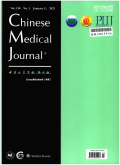Association of renal function with cardiac reverse remodeling and long-term outcome in heart failure patients following cardiac resynchronization therapy
摘要Background Renal insufficiency (RI) is significantly associated with clinical prognosis in patients with heart failure (HF),but direct evidences on the relation between renal function and clinical outcome in patients receiving cardiac resynchronization therapy (CRT) are limited.The aim of the current study was to systematically evaluate the association of baseline and 6-month renal function with cardiac reverse remodeling and long-term outcome after CRT.Methods We retrospectively evaluated 190 consecutive patients who underwent CRT at Fuwai Hospital from January 2008 to April 2013.Renal function tests,echocardiographic measurement,and clinical parameters at baseline and after 6 months of CRT were performed.Primary endpoint events included all-cause mortality,cardiac transplantation,and unplanned hospitalizations for HF.Results At baseline,compared with normal renal function or mild RI (estimated glomerular filtration rate (eGFR) >-60 ml·min-1·1.73 m-2),moderate-to-severe RI (eGFR <60 ml·min-1·1.73 m-2) exerted a negative influence on cardiac reverse remodeling parameters.At 6-month follow-up,114 (60.0%) patients were classified as responders and showed significant renal function improvement,whereas renal function deteriorated in non-responders and subsequently 41 (25.6%) patients developed worsening renal function (WRF).During the mean follow-up of (24.3±17.1) months,both patients with baseline eGFR <60 ml.min-1·1.73 m-2 and those with WRF experienced worse event-free survival (P <0.01,respectively).Conclusions:This analysis identified that baseline eGFR as well as WRF after CRT were found to be independent determinants of the combined endpoints of all-cause mortality and HF-related hospitalizations in CRT recipients.
更多相关知识
- 浏览38
- 被引1
- 下载4


相似文献
- 中文期刊
- 外文期刊
- 学位论文
- 会议论文



 换一批
换一批 换一批
换一批



